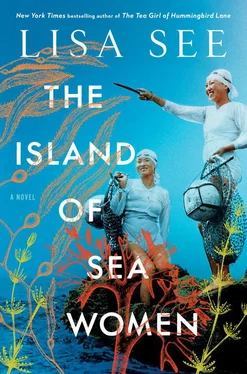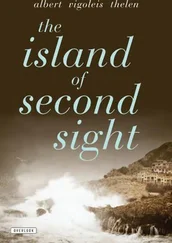In spring, the rapeseed fields bloomed yellow, stretching from the mid-mountain area all the way to the gnarled coastline. The ocean kept its relentless movement. The deep blue waters frothed one moment and became almost serene the next. I did my farming work and went to the sea. When I dove I was able to push my daughter and granddaughter from my mind. Often I was reminded of Dr. Park and his search for the mystery of why the haenyeo could withstand cold better than any other humans on earth. I think I now knew the answer. Not only did I have a coldness at my core that would not thaw but it had become as hard as ice. I could not do what Shaman Kim, Gu-sun, and so many others had told me to do. If I could not forgive, then at least I could wrap my anger and bitterness in an icy shell. Each time I sank into the sea, I stretched my mind outward, away from that shell. Where’s my abalone? Where’s my octopus? I need to make money! I need to make a living! I would continue to strive to be the best haenyeo, even if I knew it wouldn’t last.
Day 4 (continued): 2008

Young-sook doesn’t go back to the memorial hall to find her family or her friends. Instead, she makes her way to the parking lot, waits for a taxi to drop off another group of visitors, and then hires the driver to take her home. Listening to Clara and hearing Mi-ja’s voice on the recording have opened something in Young-sook. What if I was wrong all these years? Or, maybe, not wrong completely, but what if I didn’t understand some of what happened? Her mind returns again and again to the questions posed by the man who spoke earlier today: Who can name a death that was not tragic? Is there a way for us to find meaning in the losses we’ve suffered? Who can say that one soul has a heavier grievance than another? We were all victims. We need to forgive each other.
Young-sook knows she’s old, but for the first time she has a deeper understanding of what that means. Life moves fast, and the sun of her life is setting. She doesn’t have much time left to love or hate or forgive. If you try to live, you can live on well. How often did her mother-in-law recite that aphorism? And it turned out to be true. Young-sook worked all day and had body aches all night, but she would do it all again for her children, because life without them is meaningless. And yet, she’d let Joon-lee slip away. Young-sook’s anger had convinced her she didn’t care what her daughter, Yo-chan, or Mi-ja might have to say to her, but she should have tried to look them up after the guilt-by-association system ended and she’d finally gotten a passport. She’d traveled to Los Angeles to visit her family plenty of times. Just once she should have asked to be driven past the house attached to the return address on the envelopes, if only to peer at the inhabitants from the car window.
The taxi hugs the curves of Hado’s shoreline until it stops at the gate to her beachside compound. She pays the driver—the ridiculous extravagance not registering in her mind—and hurries inside. She pulls out the box with the letters from America and hobbles down to the beach. She looks around, but with the opening of the memorial, there are no haenyeo on the sand, and even the tourists are staying away.
To understand everything is to forgive. With Clara’s words in her mind, she reaches into the box, pulls out the stack of letters from America, and flips them over, so she can start at the beginning. She runs a finger over Joon-lee’s handwriting on the first envelope. She remembers what it said. Then come the ones in Yo-chan’s script. The first group arrived once a month. After six months and up until a year ago, Young-sook had received two letters a year: one on the anniversary of her mother’s death, and the other on the anniversary of the deaths of Jun-bu, Yu-ri, and Sung-soo. In the early years, each had been opened by the censors, but Young-sook’s stubbornness had kept her from pulling out the letters. Now she reaches inside the first envelope and unfolds the letter written by Yo-chan on his mother’s behalf. The censors had been active with this one, so very few characters remain. She wonders how Mi-ja could have thought she’d “understand.” She pulls the letter from the next envelope, unfolds it, and this time finds another piece of paper tucked inside. Again, the letter has writing on it, most of which has been blacked out. The other paper she recognizes right away. It’s a page from Mi-ja’s father’s book. It’s old and yellowed. Young-sook’s hands tremble as she unfolds it. Here is the first rubbing she and Mi-ja made together: the rough impression of a stone they created on the day they met.
She reaches for the next envelope: again unsealed, with a letter folded around another page from Mi-ja’s father’s book. Toilet, made the day of the big haenyeo march. The next envelope: Sunrise, the name of the boat on their first dives together. Each envelope reveals another rubbing that commemorated for two girls the places they visited and the events of their lives: the surface of a scallop shell from this very beach, a carving they’d liked in Vladivostok, the outlines of their babies’ feet. Maybe the letters that Yo-chan wrote for his mother offer words of apology or regret, but Young-sook doesn’t need to hear them. These treasures of their friendship mean so much more.
When she comes to the last rubbing she remembers making with Mi-ja, she looks at the remaining stack of letters—all of them sealed, marking that they came after censorship ended—and wonders what could be inside. The first one has another letter she cannot read. This time, however, the page from Mi-ja’s father’s book is folded around a photograph. The page from the book shows a baby’s foot. In the photograph, Joon-lee sits propped in a hospital bed, a newborn in her arms. The next letter has a rubbing on a much larger piece of paper. Young-sook can’t read it, but she recognizes the pattern of letters and numbers and realizes that it’s from her daughter’s headstone. Young-sook chokes back a sob.
Once she’s reined in her feelings, she opens the rest of the letters. Each one is accompanied by a rubbing and a photograph, showing some aspect of the life of their shared granddaughter, Janet: smiling, with her hair clipped with brightly colored barrettes, standing on the steps to a house, with a lunch box in her hand, at a holiday sing-along, graduating from elementary school, junior high, high school, and college. A wedding photo. Another baby footprint: Clara. Later, another footprint: Clara’s brother. Mi-ja had tried to tell Young-sook everything that was happening, and everything that she missed.
Young-sook’s concentrating so hard and her emotions are so strong that she’s unaware of the woman and girl who’ve approached.
“She wanted you to know us,” Janet says in her poor Jeju dialect. “And she wanted us to know you.”
Janet and Clara have changed out of the clothes they wore to the opening of the Peace Park and are now dressed almost identically in shorts, T-shirts, and flip-flops. Clara’s iPhone with the wires and earbuds dangles from her hand.
“She wanted,” Clara says, putting stress on every word, “for us to hear your story, your side. But you must hear her too. I taped Great-Granny Mi-ja for hours—”
“It started as a school project,” her mother explains.
“I’ve set this to the most important part,” Clara says. “Are you ready?”
Yes, finally, Young-sook is ready. She takes the earbuds, puts them in her ears, and nods. Clara pushes a button, and there comes Mi-ja’s old-woman voice.
“Young-sook always said I should divorce my husband, just as she always told the women in her collective who had similar experiences to mine. She was always so understanding of them when they couldn’t leave their husbands, but she could not think the same way when it came to me.”
Читать дальше













